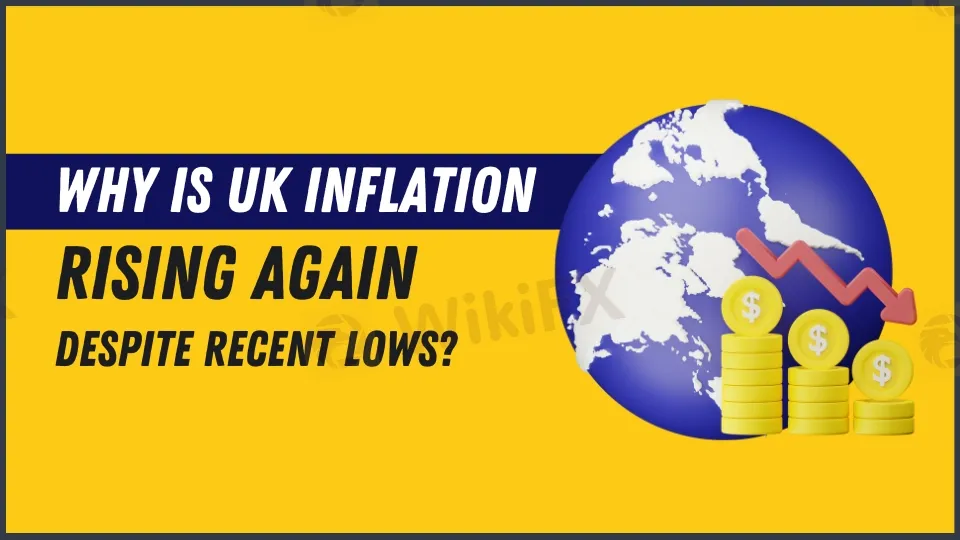简体中文
繁體中文
English
Pусский
日本語
ภาษาไทย
Tiếng Việt
Bahasa Indonesia
Español
हिन्दी
Filippiiniläinen
Français
Deutsch
Português
Türkçe
한국어
العربية
Why Is UK Inflation Rising Again Despite Recent Lows?
Abstract:October inflation rises to 2.3%, driven by energy costs. Renters face 8% annual hikes, while house price inflation climbs. Interest rates stay elevated.

The most recent economic figures portray a varied but tough picture for the country's consumers. In October, inflation, a major indicator of living costs, unexpectedly increased to 2.3%, above experts' predictions. While this rate is still much lower than the double-digit highs of previous years, the minor increase indicates that family finances are under continued strain. This move calls into doubt the larger economic recovery and millions of people's financial security.
Inflation Driven by Energy Costs
The major cause of this surge is an increase in home service expenses, with energy prices playing a considerable influence. Although energy prices had steadied earlier this year, the October spike shows that instability has returned. Many families already stressed finances are strained by these rising prices, especially as winter approaches and heating demands rise.
Trends in the Housing Market: Home Prices vs. Rent
House price inflation, another important indicator of economic health, increased little to slightly over 3%. This is a turnaround from earlier this year when prices temporarily fell into negative territory. The real impact is on tenants, who are seeing rental expenses rise by more than 8% every year.

This practice is causing an increasing hardship on renters. Unlike homeowners, who may realize long-term returns on their assets, renters confront immediate out-of-pocket expenditures with no respite in sight. The disparity between home prices and rental inflation highlights the issues that renters confront in an already costly housing market.
Interest Rates: Slowly Declining on the Horizon
The Bank of England, in charge of regulating inflation, has left interest rates at 4.75%. Earlier predictions projected that interest rates might fall to 3.5% by mid-2024. However, recent economic statistics and budgetary actions have caused expectations to alter. Following the government's recent budget declaration, interest rates are expected to stay over 4% for most of next year.
Higher interest rates are intended to reduce inflation but also raise borrowing costs for consumers and companies. Mortgage holders and those with variable-rate loans continue to face the brunt of these rate spikes, disrupting many families' financial plans.
Impacts of Government Borrowing on the Budget
The cost of borrowing by the government is another factor impacting the economic outlook. The UK's borrowing costs increased significantly after the latest budget. While the rise was less significant than the one after Liz Truss' 2022 mini-budget, it nevertheless raises worries about fiscal stability and market confidence. The increased borrowing rates restrict the government's ability to implement further steps to alleviate family financial concerns.
Last Thoughts
Inflation and rental expenses are rising, while many people's wages are stagnating, making the next months difficult. While inflation has decreased from recent highs, it remains a severe problem, especially for renters and low-income families.
Policymakers must strike a difficult balance: reduce inflation without suffocating economic development or laying undue costs on already suffering consumers. With interest rates predicted to stay high and energy prices fluctuating, the cost-of-living dilemma is likely to continue to be a major worry far beyond 2024.

Disclaimer:
The views in this article only represent the author's personal views, and do not constitute investment advice on this platform. This platform does not guarantee the accuracy, completeness and timeliness of the information in the article, and will not be liable for any loss caused by the use of or reliance on the information in the article.
Read more

Should You Beware of Forex Trading Gurus?
Know the reality behind forex trading gurus, examining their deceptive tactics, inflated promises, and the risks associated with trusting them for financial advice.

Why the SEC Rejected the First U.S. Bank-Issued Stablecoin
The SEC rejected the first U.S. bank-issued stablecoin, citing regulatory concerns. This decision highlights the ongoing challenges in crypto asset classification and oversight.

IG Group Acquires Freetrade for £160M to Expand UK Investment Market
IG Group acquires Freetrade for £160M, boosting its UK investment offerings. Freetrade to operate independently, with plans for growth and innovation.

Webull Launches SMSF Investment Platform with Zero Fees
Webull introduces commission-free SMSF trading, offering over 3,500 US and Australian ETFs, with no brokerage fees and enhanced portfolio tools.
WikiFX Broker
Latest News
Exposing the Top 5 Scam Brokers of March 2025: A Closer Look by WikiFX
Gold Prices Climb Again – Have Investors Seized the Opportunity?
Webull Launches SMSF Investment Platform with Zero Fees
Australian Regulator Warns of Money Laundering and Fraud Risks in Crypto ATMs
FCA Warns Against 10 Unlicensed or Clone Firms
CySEC Warns Against 14 Unlicensed Investment Websites
Top Currency Pairs to Watch for Profit This Week - March 31, 2025
Will natural disasters have an impact on the forex market?
Philippines Deports 29 Indonesians Linked to Online Scam Syndicate in Manila
AI-Powered Strategies to Improve Profits in Forex Trading
Currency Calculator







